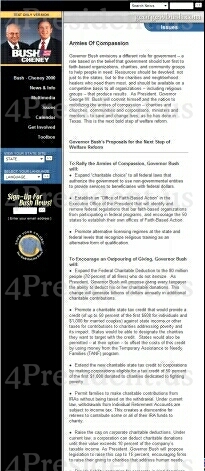|

George W. Bush 2000 On The Issues
Armies Of Compassion
Governor Bush envisions a different
role for government – a role based on the belief that government should
turn first to faith-based organizations, charities, and community groups
to help people in need. Resources should be devolved, not just to the
states, but to the charities and neighborhood healers who need them most,
and should be available on a competitive basis to all organizations –
including religious groups – that produce results. As President, Governor
George W. Bush will commit himself and the nation to mobilizing the armies
of compassion – charities and churches, communities and corporations,
ministers and mentors – to save and change lives, as he has done in Texas.
This is the next bold step of welfare reform.
Governor Bush’s Proposals for the Next Step of Welfare Reform
To Rally the Armies of Compassion, Governor Bush will:
- Expand “charitable choice” to all federal laws that authorize the
government to use non-governmental entities to provide services to
beneficiaries with federal dollars.
- Establish an “Office of Faith-Based Action” in the Executive Office
of the President that will identify and remove federal regulations that
bar faith-based organizations from participating in federal programs,
and encourage the 50 states to establish their own offices of
Faith-Based Action.
- Promote alternative licensing regimes at the state and federal
levels that recognize religious training as an alternative form of
qualification.
To Encourage an Outpouring of Giving, Governor Bush will:
- Expand the Federal Charitable Deduction to the 80 million people (70
percent of all filers) who do not itemize. As President, Governor Bush
will propose giving every taxpayer the ability to deduct his or her
charitable donations. This change will generate billions of dollars
annually in additional charitable contributions.
- Promote a charitable state tax credit that would provide a credit
(of up to 50 percent of the first $500 for individuals and $1,000 for
married couples) against state income or other taxes for contributions
to charities addressing poverty and its impact. States would be able to
designate the charities they want to target with the credit. States
would also be permitted – at their option – to offset the costs of this
credit by using money from the Temporary Assistance to Needy Families (TANF)
program.
- Extend the new charitable state tax credit to corporations by making
corporations eligible for a tax credit of 50 percent of the first $1,000
donated to charities dedicated to fighting poverty.
- Permit families to make charitable contributions from IRAs without
being taxed on the withdrawal. Under current law, withdrawals from
Individual Retirement Accounts are subject to income tax. This creates a
disincentive for retirees to contribute some or all of their IRA funds
to charity.
- Raise the cap on corporate charitable deductions. Under current law,
a corporation can deduct charitable donations until their value exceeds
10 percent of the company’s taxable income. As President, Governor Bush
will propose legislation to raise this cap to 15 percent, encouraging
firms to raise their giving to charities that address human needs.
- Provide liability protection for corporate in-kind donations. Many
charities, churches, and community groups need vehicles to transport the
elderly, computers to educate children, and facilities to hold classes.
To encourage such in-kind gifts, Governor Bush supports legislation
limiting the civil liability of businesses that donate equipment,
facilities, vehicles or aircraft to charitable organizations, except in
cases of gross negligence.
The Governor’s Record: Faith in Action
Since his first campaign for Governor in 1994, George W. Bush has made
mobilizing faith-based and charitable organizations a top priority.
Under his leadership, Texas has led the nation in enabling these groups
to deliver services to those in need. Specifically, Governor Bush:
- Created the “Governor’s Advisory Task Force on Faith-Based Community
Service Groups” in 1996 to identify obstacles to faith-based groups and
recommend ways to create an environment that permits them to flourish.
The Task Force recommendations were translated into a series of new
faith-based laws signed by Governor Bush.
- Issued an executive order in 1996 making Texas the first state in
the nation to implement the landmark “charitable choice” provision in
the 1996 federal welfare reform law. This law gives states the option
of using private and religious charities to deliver welfare services.
- Dramatically expanded “charitable choice” principles to all
contracts entered into by the Texas Department of Human Services,
abstinence education grants awarded by the Texas Department of Health,
and poverty-fighting initiatives funded by the Community Services Block
Grant Act.
- Led Texas to become the first state to permit a state prison unit to
be operated by volunteers from a church ministry.
- Thwarted an attempt by state bureaucrats to shut down various
faith-based drug treatment centers, including “Teen Challenge” in San
Antonio, and subsequently established alternative licensing procedures
that exempt non-medical faith-based programs.
- Created a pilot program establishing four “Second Chance” group
homes for unwed teen welfare mothers run by faith-based and other
private groups.
- Advocated and signed into law the Texas Religious Freedom
Restoration Act, which strengthens and protects Texans’ right to
practice their religion free from government intrusion.
- Proposed and signed a “Good Samaritan” law that provides liability
protections to health professionals who donate charitable care to needy
Texans.
- Recommended and signed a law requiring the Texas Department of Human
Services to designate certain employees as liaisons to faith-based
organizations to promote community services for the needy.
- Recommended and signed a law requiring each of Texas’ 28 local
workforce development boards to promote Welfare-to-Work partnerships
with faith-based groups in a way that respects their unique religious
character.
Source: George W. Bush for President 2000 Web Site |
|